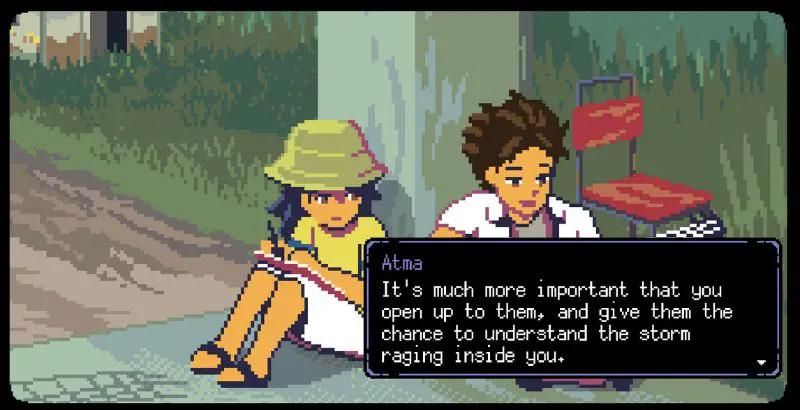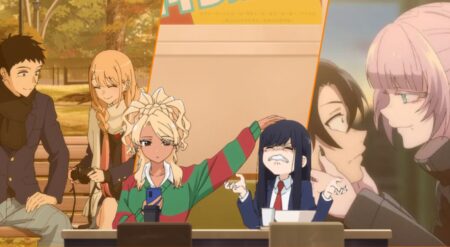The end of the year has a way of holding moments of reflection within each of us. We’ve endured lows, stood tall in our highs, and everything in between. It’s a time of revisit in every sense of the word. People flock back to their hometowns, and tufted jackets contrast weightless worded breaths that cling to the cold winter air of another year. Not every revisit is a pleasant one filled with the comforts of nostalgia. Thus, these moments of reflection serve different meanings for each individual. Yet somehow, we manage to fall back to the familiar as the end of the year draws to a close. Some video games have left a substantial impact not just on the year but on the players.
We revisit things like our favorite holiday movies or video games singularly and with others. For me, all of these, while also recalling all the games I played in the year, left a lasting impression. Whether it resonated on a personal level or served some form of impact in gaming, here are four indie video games that I reflected on throughout the year and most likely long after.
I want to define “impact” here as personal resonance and concepts implemented in a way that adds substantial weight to the video games space. While there’s a clear direction and intention behind them, each person’s experience can yield various perspectives. Thus, it creates conversation – one of the great things about video games. It’s art. So, whether it resonated on a personal level or served some form of impact in gaming, here are four indie titles that I reflected on throughout the year and most likely well after.
VENBA
![]()
Venba is a narrative cooking game that tells the story of an immigrant family spanning different moments in time. It is an unexpected emotional journey highlighting what it is like to feel torn between cultures. The story focuses on the mother, Venba. The game uses her to share a perspective on what it is like to raise a family while enduring struggles. They deal with things like equal employment opportunities and racial discrimination and how they maintain their cultural roots despite it all. How does Vebna do this? By utilizing a cooking game feature that connects culture and story through food with heartfelt sincerity. That is this video game’s impact.
As a first-generation child of refugee parents, I explored moments paralleling my own life in Venba. I remember always being in the kitchen with my mother chopping veggies for Samlar Machuor, a Cambodian sour soup, or simply just observing. During her busy day, my mother and I connected as I learned more about our cuisine and culture.
My mother aspired to be a teacher in Cambodia, but when the Khmer Rogue happened, none of her experience transferred to the States. She and my father had to start over in a new country to escape an ongoing genocide. Like Kavin in Venba, I could not understand the story my culture held at a very young age, which led to harboring misplaced resentment. Only time, reflection, and conversations with my parents as I grew older allowed me to understand the weight they carried for me and my older brother.
The pounding of a mortar and pestle would sound in the kitchen. Still, none was greater than the impact of her sharing moments of our culture and her story, whether it was just conversations about the food or her life back in Cambodia. Time in the kitchen with my mom always created conversations and moments that deepened my understanding and connection. Venba captures that.
Chants of Sennaar

Chants of Sennaar bursts with visual richness and vibrancy that equals its gameplay. The game is striking in its creative design, and it smartly combines puzzles with cultural immersion. The game’s focus is for players to decipher various languages through observation. Each new area you explore presents a different color scheme representing its environment. This continues to awe and challenge the players as they find new places with unique cultures throughout.
Glyphs, movements, and any previously learned languages build off one another, creating a deep sense of world-building. Understanding this unknown culture is gratifying, and you awaken to that. The game’s mechanics all make the player feel like a linguist and cultural anthropologist.
With no prior context of this world is and what is taking place, Chants of Sennaar pulled me in with its invitation to understand another culture and language. While it is a puzzle game, it builds a beautiful, upspoken explanation of how people are people, regardless of location. We do similar things but are defined by our dialect and cultural differences.
Chants of Sennaar grounded me. The game made me think about how we are all just people living on a spinning rock. How even through different languages and customs, we want similar things. We live similarly. We face societal challenges in similar ways. With how engrossed we all can become in our lives with our jobs, relationships, etc., it’s easy to misplace our understanding and compassion for others, whether that’s locally or in another country. That’s a fitting addition to this video games with impact list.
The Cosmic Wheel Sisterhood

The Cosmic Wheel Sisterhood manifests a world that is remarkably entrancing. Glinting with a unique visual design, the narrative continuously makes the player sink deeper into a space where isolation sparks questions about humanity and self. It cleverly ties divination with the intention for you to be the wielder of fate through your own designed personalized tarot deck. It’s a title worthy of more conversation and attention as it eventually expands on circumstances like inclusion, identity, and morality. At first glance, it gripped me as something light-hearted. However, it gradually grew more depth and complexity through its characters and the challenges they each face. By the end, I found myself wondering: “Would I have done things differently? Maybe.”
Cosmic Wheel Sisterhood can feel a little uncomfortable as it deals with our time in isolation. As Fortuna, it’s time to ourselves not be distracted by technology, people, or news. Just ourselves and our thoughts. This theme of isolation weaves an experience where I began to think about… everything. Everything from mistakes, past and present, to thoughts about how I would approach the next five years. While I generally have blips of rumination anyway, Cosmic Wheel Sisterhood dug at me a little deeper. I thought more about setting intentions and how every action holds meaning that can alter parts of our day.
The narrative experience reminds me that there are some things within my control that I have the power to change. I could pass on “accidentally” binge-watching a new K-Drama as a way to decompress from a hectic work day if it means I won’t be drowning with anxiety later to complete a task. Alternatively, I have no control over some situations, and all I can do is my best. The wheel of life will continue to spin, and Cosmic Wheel Sisterhood reminds me to be present and intentional.
A Space for the Unbound

A Space for the Unbound is set in 90s rural Indonesia in a coming-of-age story centered around two classmates. It begins like a straightforward narrative adventure offering a bit of whimsy. Eventually, it dives deep into the complexities of how we navigate hard conversations—particularly those surrounding mental health and harsher aspects of our lives. A Space for the Unbound showcases bits of Indonesian culture while expressing how compassion for others through our words and presence can be impactful.
Conversations centered around mental health have only felt more approachable in recent years, displayed now in TV shows, films, and video games. A Space for the Unbound shows compassion and patience in an utterly gentle way that brought me to tears as credits rolled. Sometimes, our deepest struggles are the ones we don’t talk about. Ones we can’t talk about. Having others besides you who show such gentleness in understanding speaks volumes and can hold changing events.
Breaking through that first layer where you can be completely vulnerable is exceedingly challenging, especially for me. As someone who has always been a rather private person, it took a crushing falling out with a broken engagement for me to open up with close friends. I cried together with them as I shared my story, and I learned it was okay to be vulnerable to people who cared deeply for me. Through heartfelt conversations, they helped me weather the storm of my depression and other mental struggles I had been trying to overcome. In A Space for the Unbound, Atma embodies the people in our lives who are there for us. They reach out a hand to pull us out of our deepest, darkest pits.
Every year, indies always have a hold on me. They continue to impress me with how they express their creativity. From narrative to visual design, features, mechanics, and themes — indies push on a front that others may not explore. And they do so in a way that is uniquely theirs and truly memorable.
The time we invest in a video game can span hours, whether in one sitting or sprawled out over days or weeks. However long we choose to play and why we continue to is uniquely our own.







